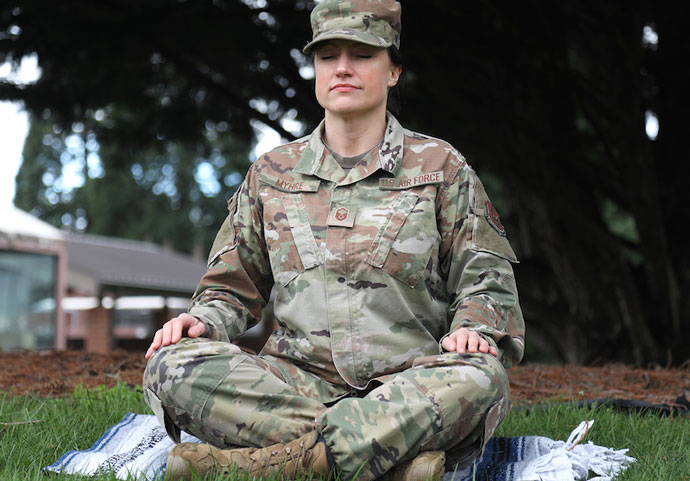You don’t have to set aside large blocks of time to improve your military fitness. In fact, the small choices you make within the course of your day can add up to improve your performance. As a Service Member who lives a high-OPTEMPO lifestyle, you can use micro moments to enhance your military performance and wellness.
The trick is to find small windows of opportunity and make choices that prioritize your health and well-being. Whether you only have 1, 5, or 10 minutes, consider the suggestions below as ways you can build up minutes over time to improve your overall health and wellness.
If you only have 10 minutes
Go for a fast walk, enough to raise your heart rate but not necessarily make you sweat.
- Physical activity can cause changes in certain hormones, endorphins, and other neurotransmitters in your body that influence your mood, emotions, and brain health. Getting your heart rate up for an extra 10 minutes a day can also make small improvements to your heart health.
Do a guided meditation.
- Mindfulness meditation trains you to choose where you want to focus your attention. Regular mindfulness meditation practice (8+ weeks) increases activity in many areas of the brain responsible for complex information processing, introspection, self-awareness, and self-regulation of attention and emotion. When those regions work more and better, you’re more able to focus your attention and regulate your emotions.
Spend time outside.
- Nature is a restorative environment, which can help you recover from mental fatigue and build mental fitness.
If you only have 5 minutes
Take a quick walk.
- Any steps are better than no steps when you’re working to improve your heart health.
Stretch.
- Stretching can help you be more flexible, which could make some physical activities easier and possibly reduce pain and improve posture. Its movement—but time spent stretching doesn’t count toward exercise time.
Eat mindfully.
- Take a few moments to engage your senses when eating. How does your food look, smell, taste, or feel?
Read an article on HPRC-online.org about a topic that’s relevant to you.
- Challenge yourself to learn something new and think about your health and wellness in a different way.
If you only have 1 minute
Reflect on something or someone you’re grateful for.
- People who are grateful tend to sleep longer and wake up more energized. Gratitude can protect against burnout and strengthen relationships. People who show high levels of gratitude are seen as wiser. And practicing gratitude can improve your ability to deal with problems.
Tell someone you’re grateful for them.
- Expressing gratitude to others helps them feel more valued, leading them to spend more time working on tasks. It can also help others feel more satisfied at work and act more respectfully to one another.
Drink water.
- By the time you’re thirsty, you might already be a bit dehydrated. Take small sips of water often throughout the day.
Ask yourself “How do I feel right now—physically and emotionally?”
- The feelings you experience throughout the day help you make decisions, respond to those around you, and connect to your environment. Increasing your awareness of how you feel helps you make more productive, proactive choices.
